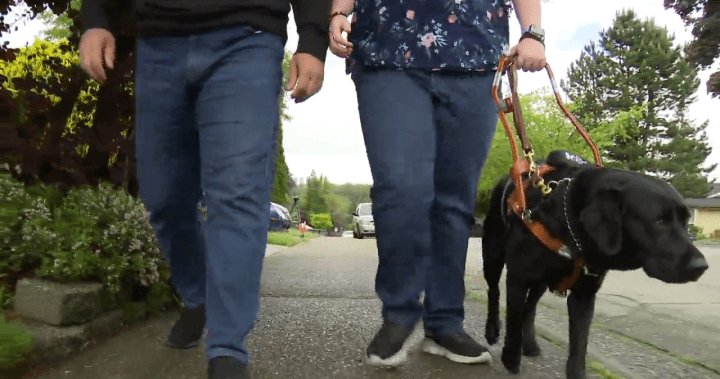A Surrey woman’s routine shopping trip has escalated into a heated controversy after she was repeatedly denied entry to local Walmart stores with her certified guide dog, raising serious questions about accessibility rights in British Columbia.
Andrea Bailey, legally blind since childhood, relies on her certified guide dog Romeo to navigate daily life. Yet on three separate occasions over the past month, Bailey reports being stopped at Walmart entrances by employees who refused to acknowledge Romeo’s status as a legitimate service animal despite his clearly visible guide dog harness and identification.
“It’s humiliating and exhausting to constantly defend your basic right to access public spaces,” Bailey told CO24 News during an interview at her Surrey home. “Romeo isn’t a pet—he’s my mobility tool, my independence, and legally protected under provincial legislation.”
Under British Columbia’s Guide Dog and Service Dog Act, certified guide dogs and their handlers are guaranteed access to any public facility or business that serves the general public. Businesses that deny this access can face fines up to $3,000.
The incidents occurred at two different Surrey Walmart locations, with Bailey documenting each encounter. During the most recent incident, Bailey recorded a staff member claiming, “We don’t allow dogs in the store for health reasons,” despite her presentation of official guide dog certification.
Disability rights advocates are calling this case part of a troubling pattern. Jennifer Morris, executive director of Accessibility BC, explained to CO24 News that service animal denials remain surprisingly common despite clear legislation.
“These incidents reveal a serious training gap in major retailers,” Morris said. “Service animal handlers shouldn’t need to become legal experts or advocates just to buy groceries.”
A spokesperson for Walmart Canada has issued a statement expressing regret over the incidents, claiming they represent a deviation from company policy.
“We sincerely apologize to Ms. Bailey for her experiences, which do not reflect our commitment to accessibility,” the statement reads. “We are implementing immediate additional training for all staff on service animal accommodation and have reached out to Ms. Bailey directly.”
The company has promised to review its training procedures and ensure all employees understand the legal rights of guide dog handlers.
The case highlights the ongoing challenges faced by Canadians with disabilities in public spaces. According to recent data from the Canadian National Institute for the Blind, nearly 70% of guide dog handlers report experiencing access denials despite clear legal protections.
For Bailey, the issue extends beyond her personal experience. “This isn’t just about me and Romeo—it’s about ensuring that businesses understand and respect disability rights,” she said. “The next person might not have the resources or energy to fight back.”
As this situation unfolds, it raises a crucial question for our communities: When will accessibility move from being a legal obligation to a fundamental standard in Canadian retail culture?

























